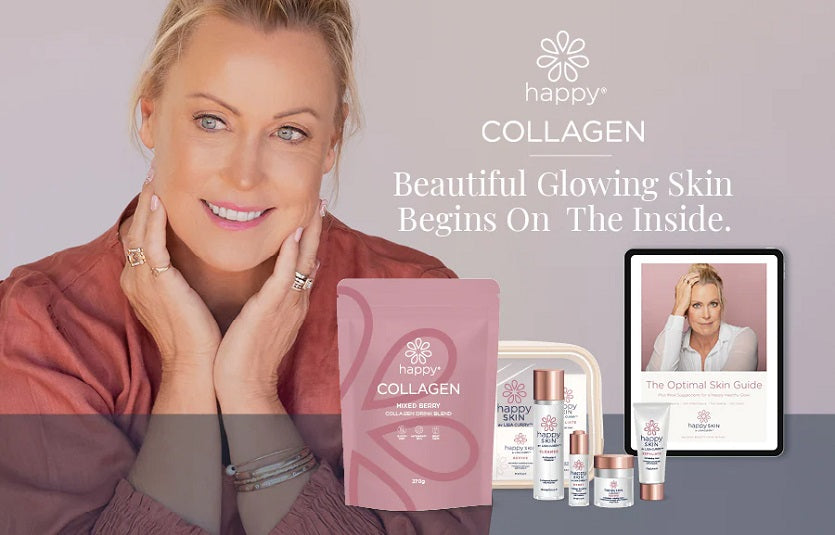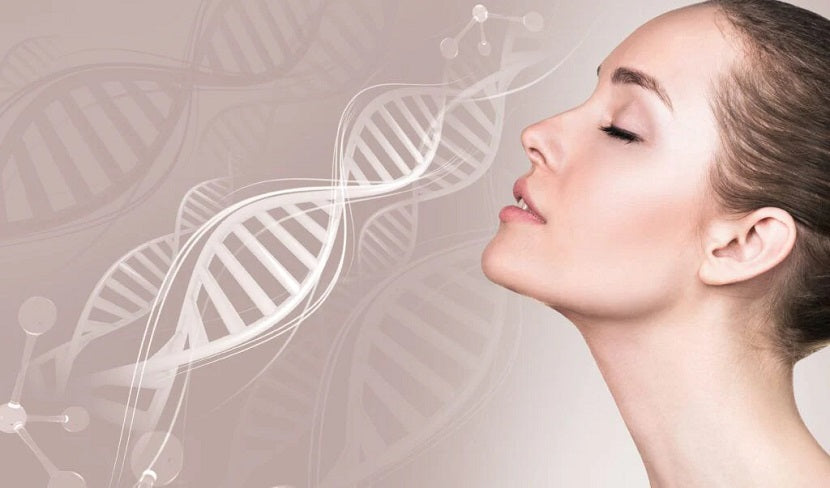Over the past 5 years, hundreds of collagen products have flooded the market. At first, I was skeptical of collagen, believing that most of the collagen would simply be digested as protein and have little to no effect on skin health and aging.
" I have been proven wrong."
Not just from the clinical trials but from the hundreds of thousands of women in our communities who that had been raving about the effects of collagen on their skin health.
As with all science, there is never conclusive evidence, with some studies showing evidence of positive effects whilst others do not. That’s science, unfortunately, but it is the anecdotal evidence from consumers and the fact that collagen has become the most popular health supplement over the past 5 years tells me it is having a positive effect on people’s health and wellbeing.
I then started to research further the different forms of collagen and also what else can assist in skin health and slowing the aging process. What I discovered is there is a lot of misinformation about collagen, and collagen is just part of the total story when it comes to aging. Let me break it all down for you and explain the facts.
What Causes Aging?
1. Skin Structure
Your skin structure or matrix degrades over time. This is the normal process of aging however your nutritional status, antioxidants status, acid/alkaline status and digestive health all influence how quickly this degradation occurs.
The key nutritional components needed for the skin are collagen, silica, zinc and vitamin C. This is where collagen especially can play an important role in maintaining the skin matrix over time and to a certain degree repairing some of the damage. Apart from being a major nutritional component in the skin matrix, collagen holds fluid in our tissues. As we age and collagen levels decline the tell-tale signs of aging, wrinkles, are affected by the skins ability to hold fluid in the cells and cellular structures of the skin. Through supplementing with collagen, levels of collagen increase and fluid levels can be restored which gives the common effect of collagen plumping the skin and reducing the depth of wrinkles.
There actually 28 forms of collagen however only 5 main types of collagen. Type I, II, III, IV and V.
90% of the bodies collagen is made up of type I , II and III, with type I and III being the most important for skin health whilst type II is more present in cartilage and joints. So for skin health the most important forms of collagen are I and III with Bovine collagen being the most abundant in these forms. Marine collagen is more abundant in types I and II.
2. Antioxidant Status
The process of aging is akin to rusting. The same biochemical processes involved in metal rusting occurs within our bodies on a daily basis. It is called oxidation. It is a natural physiological process in every cell within the body as part of cellular metabolism however when the levels of antioxidants reduce then oxidation can become excessive. Consuming a diet high in natural antioxidants assists to keep oxidation levels in check and effectively slows the aging(oxidation) process.
3. Nutritional Status
Apart from Collagen, Silica, Zinc and Vitamin C as key nutritional compounds for skin health, your overall nutritional status is vital for skin radiance and health. Essential fatty acids from fish, nuts and seeds and plants also assist to reduce inflammation in the skin and the fatty acids also assist in maintaining hydration levels within the cells which is important for skin health.
B vitamins, minerals and amino acids all make up the total nutritional status of a person and the healthier your diet, the better your nutritional status and antioxidant status
4. Digestive Health
Our digestion is not very often discussed when it comes to skin health, however it plays several vital roles in your overall skin health and lustre. Take for example acne or rosacea. Improving digestive clearance, i.e bowel motions and establishing a healthy bacterial balance in the digestive tract often clears Acne and Roscea which are inflammatory skin conditions.
The skin is an elimination organ and when the digestive tract is not eliminating efficiently, then the skin suffers. Greasy skin can also be associated with gall bladder function which is part of your digestive processes.
The digestive tract is also responsible for the assimilation of our nutrients from the foods we eat. If your digestive capacity is weakened, as typically occurs as we age, then the vital nutrients needed for skin health, especially collagen, zinc and silica is reduced. Focusing on rebuilding healthy digestive bacterial levels is really key in improving overall skin health.
5. Skin Microbiome
Just as our digestive tracts contain healthy bacteria necessary for skin health, our skin has it’s own microbiome. This is a little known part of our ecology however so important for skin health. Just like antibiotics can destroy healthy bacteria, many of us have used and currently use face cleansers and washes which contain antibacterial compounds thinking we are killing the bad bacteria. You are, but also killing your good bacteria at the same time and this allows the bad bacteria to grow back as we never really repopulate the good bacteria. This is why each product in the Happy Skin by Lisa Curry product range contains skin probiotics. This is the secret why is works so well apart from the concentrated skin nutrients in the products.
So now we understand the core factors in improving skin health, it makes it easier to understand the ingredient selection in Happy Collagen. Each ingredient was specifically chosen to support each of the above pathways in the body. Most collagen products on the market contain only collagen or a few other ingredients. If you really want to see results the formulation needs to focus on overall skin health and aging otherwise you are only giving the body part of what it needs.
What Are The Happy Collagen Ingredients?
- Collagen peptides Bovine type I and III
- Antioxidants - Blueberries, Pomegranate, Amla, Camu Camu,
- Nutritionally concentrated - Broccoli sprout, Chlorella, Matcha, Alfalfa
- Vitamin C - Hibiscus, Rosehip, Acerola cherry, Monk fruit, Elder berry
- Silica and Zinc- Horsetail, Rice hulls
- Blood cleansers - Beetroot, Burdock root, Nettle leaf, Schisandra
- Liver, immune system and anti-inflammatory - Maitake, shiitake
- Digestive health - Prebiotic fibre from Hydrolyzed guar gum, Probiotics, Papain
In a 12-week study supplementing oral collagen peptides showed:
- 35% reduction in overall wrinkle score
- 20% improvement in cheek elasticity
- 23% improvement in overall face elasticity
- 14% increase in hydration
- 22% increase in radiance
- 25% increase in firmness
- 20% reduction in eye wrinkles
- Protective mechanisms against skin-autoimmune conditions
- Improves skin turnover rate
Summary
Skin health is a reflection of your overall health. Taking collagen will certainly help, however when you have a holistic approach by including all the nutrients your skin needs for vitality and an external skin care that supports your skin microbiome, then you will see the most dramatic and long lasting results.
To supercharge this approach you can also follow our Optimal Skin Guide which is a dietary program maximising your skin nutrition and internal health.










Leave a comment
This site is protected by hCaptcha and the hCaptcha Privacy Policy and Terms of Service apply.